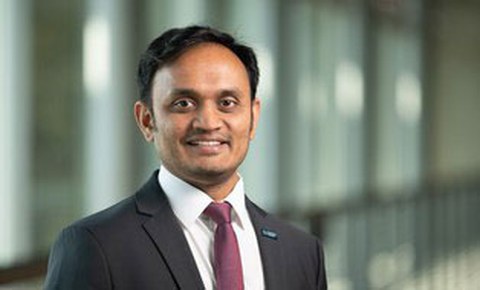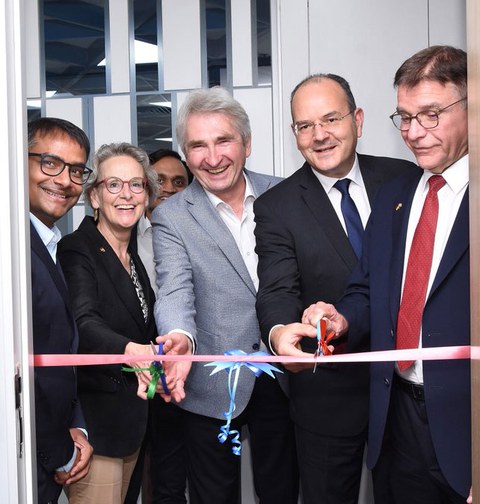11.08.2025
Indische Talente – Schnittstelle und transCampus Madras
Dagmar Möbius

Dr. Avinash Chekuru ist als Berater Impact Partnerships tätig.
Dr. Avinash Chekuru arbeitet seit 2023 als Berater für die strategischen Partnerschaften der TUD im Globalen Süden. Dabei hilft ihm neben seiner wissenschaftlichen Expertise seine aktive Führungsrolle im Indischen Verein Dresden e.V.
Das Sächsische Verbindungsbüro für Wissenschaft in Indien mit Sitz in Chennai unterstützt alle 15 sächsischen Hochschulen.
Seit wann bekleiden Sie diese Position und wie sind Sie dazu gekommen?
Seit Oktober 2023 bin ich als Berater für strategische Partnerschaften der TUD im Globalen Süden tätig. Mein Werdegang an der Universität begann 2008 mit einem Master in Molekularer Bioingenieurwissenschaften, auf den ein Doktorat in Regenerativer Medizin im Rahmen des Max-Planck-Doktorandenprogramms folgte. Später arbeitete ich als Postdoktorand an der TUD.
Im Laufe der Zeit habe ich mich zunehmend an der Schnittstelle zwischen Wissenschaft, Innovationsökosystemen und internationaler Zusammenarbeit engagiert – insbesondere zwischen Deutschland und Indien. Meine aktiven Führungsaufgaben bei der Indian Association Dresden e.V., die sich hauptsächlich aus Studenten und Wissenschaftlern zusammensetzt, haben ebenfalls zur Förderung früherer Kooperationen beigetragen. Diese Erfahrungen sowie meine langjährige Verbindung zur TUD haben zu meiner derzeitigen Position geführt, in der ich strategische Partnerschaften mitgestalte und ausbaue, die Forschung, Innovation und Technologietransfer im globalen Süden fördern.
Welche konkreten Projekte halten Sie für besonders wichtig und warum?
Mehrere Initiativen sind von strategischer Bedeutung – insbesondere solche, die gemeinsame Forschung, Ausbildung und Technologietransfer miteinander verbinden.
Ein wichtiger Aspekt ist die transCampus-Partnerschaft mit Indian Institute of Technology Madras (IIT Madras), welche die höchste Ebene der Zusammenarbeit zwischen Universitäten verkörpert. Sie bietet einen langfristigen Rahmen für die Zusammenarbeit in den Bereichen Forschung, Bildung und Innovation. Ebenso bedeutend ist die Einrichtung des Sächsischen Wissenschaftsbüros Indien mit Sitz in Chennai. Diese einzigartige Initiative unterstützt alle 15 Hochschulen in Sachsen und dient als strategische Schnittstelle zum dynamischen akademischen und innovativen Ökosystem Indiens.
Ein weiteres wirkungsvolles Projekt ist die Entwicklung eines gemeinsamen Start-up-Austauschprogramms, welches die Internationalisierung von Deep-Tech-Unternehmen erleichtert. Während transCampus die akademische Zusammenarbeit fördert, unterstützt der Startup-Austausch den bidirektionalen Technologietransfer und das Liaison Office dient als strukturelles Rückgrat für eine langfristige strategische Zusammenarbeit.

Im Oktober 2024 eröffneten der Freistaat Sachsen und TUD ein wissenschaftliches Koordinationsbüro in Indien.
Was wurde bereits erreicht und was sollten Alumni über Ihre Arbeit wissen?
In nur einem Jahr in meiner Funktion haben wir mehrere wichtige Meilensteine erreicht:
- Das Rahmenabkommen „transCampus“ mit dem IIT Madras wurde im Oktober 2024 unterzeichnet, um die Zusammenarbeit in Schlüsselbereichen wie Mikroelektronik, nachhaltiger Technik, Verkehr, Medizin und Unternehmertum zu formalisieren. Die Partnerschaft fand während der 7. Regierungskonsultationen zwischen Deutschland und Indien hohe Anerkennung und wurde vom indischen Premierminister in seiner offiziellen Rede erwähnt – ein historischer Moment für die TU Dresden, da sie damit erstmals in einem G2G-Dokument erwähnt wurde.
- Das sächsische Wissenschaftsbüro in Indien wurde in Rekordzeit eingerichtet: Die Personalrekrutierung, die Einarbeitung und die offizielle Eröffnung wurden innerhalb von sechs Monaten abgeschlossen. Während Bayern und Baden-Württemberg Vertretungen für Hochschulen in Indien unterhalten und Bundesländer wie Nordrhein-Westfalen, Hamburg und Hessen Wirtschaftsförderungsbüros betreiben, ist Sachsen nun das dritte Bundesland mit einem eigenen Wissenschaftsbüro in Indien, das am 23. Oktober in Chennai offiziell eröffnet wurde. Es dient nun als zentrale Drehscheibe, welche die 15 sächsischen Hochschulen mit indischen Akteuren aus Wissenschaft, Politik und Innovation vernetzt.
- Im Bereich Start-ups und Technologietransfer gab es in der Vergangenheit nur eine wenige zentralisierte Zusammenarbeit zwischen Indien und Deutschland. Unter der Leitung von Prof. Andreas Pinkwart (TUD|excite) haben wir ein umfassendes Rahmenwerk entwickelt und im August 2024 eine gemeinsame Start-up-Austauschinitiative mit dem Titel „Global Leadership in Assistive Technology” ins Leben gerufen. Die Veranstaltung wurde vom sächsischen Staatssekretär, dem Botschafter der Republik Indien in Deutschland (jetzt indischer UN-Vertreter) und der TUD-Rektorin eröffnet. Mehr als 70 Unternehmer, Start-ups und politische Entscheidungsträger aus beiden Ländern kamen zusammen, um gemeinsam inklusive Technologielösungen zu entwickeln. Ein wichtiges Ergebnis war die Unterzeichnung einer formellen Absichtserklärung mit dem IIT Madras Research Park – die erste internationale Start-up-Vereinbarung sowohl für unsere Universität als auch für das IITMRP.
Seitdem haben wir unser Engagement weiter ausgebaut. Zuletzt haben wir gemeinsam einen indisch-deutschen Start-up-Pavillon auf der GITEX Europe in Berlin ausgerichtet, in dem zehn Top-Start-ups aus Indien und Deutschland (mit Bewertungen zwischen 20 und 800 Millionen Euro) vorgestellt wurden. Im Ergebnis unterzeichneten zwei Start-ups Absichtserklärungen für eine gegenseitige Förderung und den Zugang zu den Innovationsökosystemen des jeweils anderen – ein wichtiger Schritt hin zu einem bilateralen Austausch zwischen Start-ups.
Ich hatte die Ehre, einen Beitrag zur deutschen Migrationsstrategie für Indien (Seiten 31–32) beizusteuern, der 2024 vom Bundeskabinett befürwortet wurde. Als derzeit einzige länderspezifische Migrationsstrategie Deutschlands konzentriert sie sich darauf, die Mobilität von Fachkräften und den Innovationsaustausch mit nationalen strategischen Zielen in Einklang zu bringen. Mein Beitrag stützte sich auf die internationalen TUD-Netzwerke, um eine Brücke zwischen Politik und Praxis in den Bereichen akademische Zusammenarbeit und technologische Innovation zu schlagen.
In den letzten 18 Monaten haben wir außerdem mehr als 15 hochrangige Delegationen nach Dresden begleitet und auch in Indien empfangen. Zu den nennenswerten Besuchen zählen Delegationen der sächsischen Landesministerien (SMWK, SMWA) nach Indien sowie Besuche indischer Würdenträger – darunter der Botschafter Indiens und der Minister für Industrie des Bundesstaates Tamil Nadu – an der TUD, ergänzt durch zahlreiche Workshops und strategische Treffen.
Mit Blick auf die Zukunft wollen wir die transCampus-Partnerschaft mit dem IIT Madras weiter ausbauen und gleichzeitig neue strategische Kooperationen in Indien, Afrika und im gesamten globalen Süden aktiv entwickeln. Unser Ziel ist es, durch weltweit wirkungsvolle Arbeit in den Bereichen Mikroelektronik, Gesundheitstechnologie, nachhaltige Innovation und Deep-Tech-Unternehmertum einen Beitrag zur TUD-Exzellenzstrategie zu leisten.
Referenzen
- Gemeinsame Erklärung: 7. Indisch-deutsche zwischenstaatliche Konsultationen (IGC)
Bundesregierung, Oktober 2024
Erklärung Punkt 31 – Strategische Zusammenarbeit mit der TU Dresden - Video: Premierminister der Republik Indien – IGC Schlussbemerkungen
Höhepunkte der Vereinbarungen zwischen Dresden und Chennai
Aufzeichnung von 9:30 Uhr - Strategie zur Gewinnung qualifizierter Migranten aus Indien
Bundesministerium für Arbeit und Soziales (BMAS), 2024
Beitrag Sachsens auf den Seiten 31–32
Download PDF (BMAS) - Offizielle Eröffnung: Sächsische Landesvertretung Indien (Chennai)
Medienservice Sachsen, Oktober 2024
Pressemitteilung (Deutsch) - Offizieller Besuch von Minister Dulig in Indien
Sächsisches Staatsministerium für Wirtschaft, Arbeit und Verkehr (SMWA), Oktober 2024
Besuchsbericht (Deutsch) - Auftakt der transCampus-Partnerschaft (TU Dresden – IIT Madras)
TU Dresden Nachrichtenportal, Oktober 2024
Artikel in deutscher Sprache - TU Dresden intensiviert Technologietransfer mit Indien
Fakultät für Ingenieurwissenschaften, TU Dresden, 2024
Zum Beitrag - TUD–transCampus–IITM präsentiert DeepTech-Innovationen auf der GITEX Europa
TU Dresden International Cooperation Office, 2024
Rückblick und Höhepunkte der Veranstaltung - TU Dresden führend bei der Förderung medizinischer Innovationen der deutsch-indischen Zusammenarbeit in den Bereichen KI, XR und Robotik
TU Dresden Nachrichtenportal, 2024
Zum Beitrag (Deutsch) - Sachsen und der indische Bundesstaat Tamil Nadu vereinbaren wissenschaftliche und technologische Zusammenarbeit
Sächsisches Staatsministerium für Wissenschaft, Kultur und Tourismus (SMWK), November 2023
Pressemitteilung (Deutsch) - Neuer Botschafter Indiens wählt TU Dresden für seinen ersten Universitätsbesuch in Deutschland
TU Dresden Nachrichtenportal, Dezember 2024
Zum Beitrag
Kontakt:
Dr. Avinash Chekuru
Referent / Berater Impact Partnerships (Globaler Süden)
TUD, International Office
